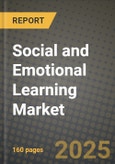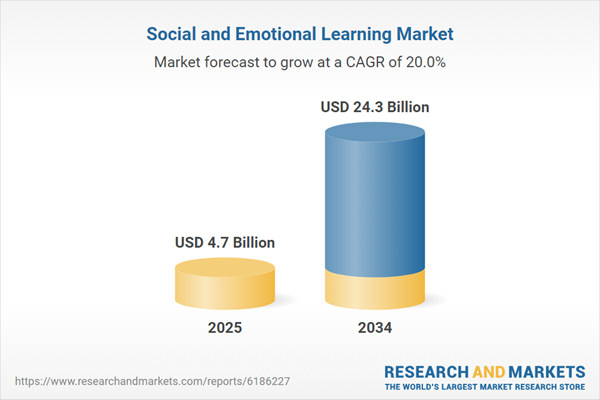Social and Emotional Learning (SEL) is increasingly recognized as a fundamental component of education systems around the world. By equipping individuals - particularly students - with essential life skills such as emotional regulation, empathy, resilience, and interpersonal communication, SEL enhances both academic achievement and overall well-being. As societal awareness of mental health and emotional intelligence grows, SEL has evolved from a supplementary initiative to a core pillar of educational policy and pedagogy. Schools, districts, and education ministries are embedding SEL into curricula, extracurricular activities, and teacher training programs. Additionally, SEL is gaining traction in corporate training, parenting resources, and community programs, reflecting its value across all life stages. This expanding landscape is encouraging the development of digital tools, apps, and platforms that support SEL instruction, assessment, and integration into diverse learning environments. The market is poised for steady expansion, influenced by an inclusive approach that considers cultural relevance, developmental stages, and diverse learning needs.
The SEL market witnessed a series of pivotal developments. Schools and organizations moved towards hybrid learning environments, intensifying the demand for flexible SEL tools that could function both in-person and online. SEL programs were increasingly embedded in broader educational technology suites, with seamless integration into Learning Management Systems (LMS) and digital classrooms. Teachers showed growing reliance on real-time analytics and feedback dashboards to track student progress in social-emotional competencies. Government-backed initiatives targeting student mental health saw widespread adoption, as policymakers emphasized early intervention strategies to mitigate the long-term psychological effects of academic stress and social isolation. At the same time, SEL providers worked to diversify their content, including multilingual modules and culturally responsive materials to serve more inclusive demographics. Collaborations with nonprofit mental health organizations and educational research institutes also grew, leading to more data-informed and evidence-based SEL frameworks tailored for specific student populations.
The SEL is expected to undergo significant advancements in customization and delivery. Artificial intelligence and adaptive learning engines will likely reshape how SEL programs assess learner needs, offering dynamic content tailored to individual emotional growth trajectories. As workforce demands shift, more educational institutions will incorporate SEL as part of career readiness initiatives, aligning emotional intelligence with future job skills. The global emphasis on well-being, accelerated by pandemic recovery policies, will continue to drive SEL adoption in both public and private education systems. Governments are likely to introduce formal SEL mandates in school curriculums, supported by public funding and international collaboration. In addition to schools, sectors such as healthcare, sports, and law enforcement are expected to explore SEL-based training programs. While the market will expand geographically and demographically, ensuring quality implementation and training for educators will remain crucial. Vendors will be challenged to balance scale with personalization, making innovation in delivery methods a central focus of future growth strategies.
Key Insights: Social and Emotional Learning Market
- Hybrid Learning Integration: SEL platforms are evolving to suit hybrid education models, enabling educators to seamlessly deliver social-emotional content across both digital and physical classrooms with increased flexibility and real-time adaptability.
- AI-Enhanced Personalization: SEL tools are increasingly leveraging artificial intelligence to customize learning experiences, tailoring emotional development activities to individual needs, learning styles, and behavioral feedback loops.
- Cross-Sector Expansion: SEL programs are extending beyond classrooms into corporate, healthcare, and community sectors, where emotional intelligence and social cohesion are becoming priorities in training and engagement.
- Culturally Responsive Content: Providers are developing SEL materials that reflect cultural diversity and equity considerations, ensuring relevance and relatability for students from varied backgrounds and experiences.
- Evidence-Based Design: The market is trending toward SEL programs that are grounded in psychological and pedagogical research, with institutions increasingly demanding outcome-based models and peer-reviewed validation.
- Rising Focus on Student Mental Health: Educational institutions are prioritizing emotional well-being alongside academics, responding to heightened awareness of student anxiety, depression, and behavioral challenges.
- Government Policy Support: New regulations and funding streams are promoting the inclusion of SEL in formal education systems, enabling wider implementation across schools and districts.
- Demand for 21st Century Skills: Employers and educators alike are recognizing that soft skills like empathy, collaboration, and resilience are critical for success in modern workplaces and society at large.
- Growth in EdTech Adoption: As schools continue digital transformation, SEL solutions are finding easier entry points through integration with popular edtech platforms and remote learning infrastructures.
- Uneven Implementation Across Regions: While interest in SEL is global, access to quality programs varies widely by geography and socioeconomic status, creating disparities in program reach, educator training, and content relevance across school systems.
Social and Emotional Learning Market Segmentation
By Component
- Solutions
- Services
By Insights
- Web-Based
- Application
By Core Competencies
- Self-awareness
- Self-management
- Social Awareness
- Relationship Skills
- Responsible Decision-making
By End-User
- Pre-K (Prekindergarten)
- Elementary Schools
- Middle and High Schools
Key Companies Analysed
- Pearson PLC
- Udemy Inc.
- Coursera Inc.
- Promethean World Ltd.
- Outschool
- Byju's
- Vector Solutions
- Kahoot!
- Hurix Digital
- edX Inc.
- TutorMe
- BASE Educational Services Private Limited
- Panorama Education
- EVERFI Inc.
- Nearpod Apps LLC
- Quizlet
- Edmentum Inc.
- BrainPOP
- Illuminate Education
- Rethink ED
- Aperture Education LLC
- Everyday Speech
- Emotional ABCs
- Kickboard Inc.
- Evolution Labs Inc.
- The Social Express Inc.
- Peekapak
- Taproot Learning
- Weld North LLC.
Social and Emotional Learning Market Analytics
The report employs rigorous tools, including Porter’s Five Forces, value chain mapping, and scenario-based modeling, to assess supply-demand dynamics. Cross-sector influences from parent, derived, and substitute markets are evaluated to identify risks and opportunities. Trade and pricing analytics provide an up-to-date view of international flows, including leading exporters, importers, and regional price trends.Macroeconomic indicators, policy frameworks such as carbon pricing and energy security strategies, and evolving consumer behavior are considered in forecasting scenarios. Recent deal flows, partnerships, and technology innovations are incorporated to assess their impact on future market performance.
Social and Emotional Learning Market Competitive Intelligence
The competitive landscape is mapped through proprietary frameworks, profiling leading companies with details on business models, product portfolios, financial performance, and strategic initiatives. Key developments such as mergers & acquisitions, technology collaborations, investment inflows, and regional expansions are analyzed for their competitive impact. The report also identifies emerging players and innovative startups contributing to market disruption.Regional insights highlight the most promising investment destinations, regulatory landscapes, and evolving partnerships across energy and industrial corridors.
Countries Covered
- North America - Social and Emotional Learning market data and outlook to 2034
- United States
- Canada
- Mexico
- Europe - Social and Emotional Learning market data and outlook to 2034
- Germany
- United Kingdom
- France
- Italy
- Spain
- BeNeLux
- Russia
- Sweden
- Asia-Pacific - Social and Emotional Learning market data and outlook to 2034
- China
- Japan
- India
- South Korea
- Australia
- Indonesia
- Malaysia
- Vietnam
- Middle East and Africa - Social and Emotional Learning market data and outlook to 2034
- Saudi Arabia
- South Africa
- Iran
- UAE
- Egypt
- South and Central America - Social and Emotional Learning market data and outlook to 2034
- Brazil
- Argentina
- Chile
- Peru
Research Methodology
This study combines primary inputs from industry experts across the Social and Emotional Learning value chain with secondary data from associations, government publications, trade databases, and company disclosures. Proprietary modeling techniques, including data triangulation, statistical correlation, and scenario planning, are applied to deliver reliable market sizing and forecasting.Key Questions Addressed
- What is the current and forecast market size of the Social and Emotional Learning industry at global, regional, and country levels?
- Which types, applications, and technologies present the highest growth potential?
- How are supply chains adapting to geopolitical and economic shocks?
- What role do policy frameworks, trade flows, and sustainability targets play in shaping demand?
- Who are the leading players, and how are their strategies evolving in the face of global uncertainty?
- Which regional “hotspots” and customer segments will outpace the market, and what go-to-market and partnership models best support entry and expansion?
- Where are the most investable opportunities - across technology roadmaps, sustainability-linked innovation, and M&A - and what is the best segment to invest over the next 3-5 years?
Your Key Takeaways from the Social and Emotional Learning Market Report
- Global Social and Emotional Learning market size and growth projections (CAGR), 2024-2034
- Impact of Russia-Ukraine, Israel-Palestine, and Hamas conflicts on Social and Emotional Learning trade, costs, and supply chains
- Social and Emotional Learning market size, share, and outlook across 5 regions and 27 countries, 2023-2034
- Social and Emotional Learning market size, CAGR, and market share of key products, applications, and end-user verticals, 2023-2034
- Short- and long-term Social and Emotional Learning market trends, drivers, restraints, and opportunities
- Porter’s Five Forces analysis, technological developments, and Social and Emotional Learning supply chain analysis
- Social and Emotional Learning trade analysis, Social and Emotional Learning market price analysis, and Social and Emotional Learning supply/demand dynamics
- Profiles of 5 leading companies - overview, key strategies, financials, and products
- Latest Social and Emotional Learning market news and developments
Additional Support
With the purchase of this report, you will receive:- An updated PDF report and an MS Excel data workbook containing all market tables and figures for easy analysis.
- 7-day post-sale analyst support for clarifications and in-scope supplementary data, ensuring the deliverable aligns precisely with your requirements.
- Complimentary report update to incorporate the latest available data and the impact of recent market developments.
This product will be delivered within 1-3 business days.
Table of Contents
Companies Mentioned
- Pearson PLC
- Udemy Inc.
- Coursera Inc.
- Promethean World Ltd.
- Outschool
- Byju's
- Vector Solutions
- Kahoot!
- Hurix Digital
- edX Inc.
- TutorMe
- BASE Educational Services Private Limited
- Panorama Education
- EVERFI Inc.
- Nearpod Apps LLC
- Quizlet
- Edmentum Inc.
- BrainPOP
- Illuminate Education
- Rethink ED
- Aperture Education LLC
- Everyday Speech
- Emotional ABCs
- Kickboard Inc.
- Evolution Labs Inc.
- The Social Express Inc.
- Peekapak
- Taproot Learning
- Weld North LLC.
Table Information
| Report Attribute | Details |
|---|---|
| No. of Pages | 160 |
| Published | October 2025 |
| Forecast Period | 2025 - 2034 |
| Estimated Market Value ( USD | $ 4.7 Billion |
| Forecasted Market Value ( USD | $ 24.3 Billion |
| Compound Annual Growth Rate | 20.0% |
| Regions Covered | Global |
| No. of Companies Mentioned | 29 |









